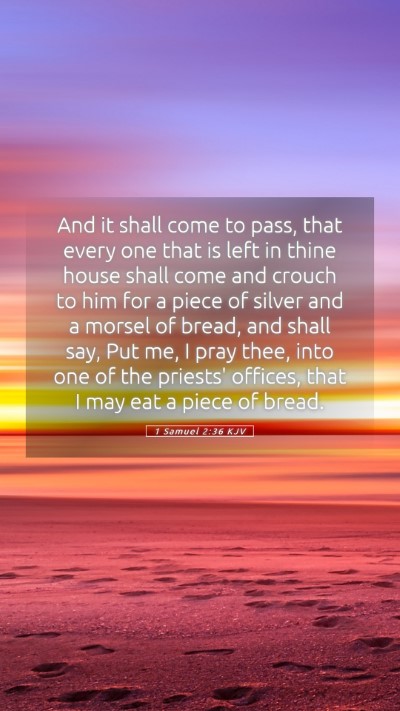Bible Verse Commentary on 1 Samuel 2:36
1 Samuel 2:36 states:
"And it shall come to pass, that every one that is left in thine house shall come and crouch to him for a piece of silver and a morsel of bread, and shall say, Put me, I pray thee, into one of the priest’s offices, that I may eat a piece of bread."
Summary of Meaning
This verse serves as a prophetic pronouncement regarding the fate of Eli's family. As the commentary from Matthew Henry emphasizes, it illustrates the complete downfall of Eli's lineage due to their transgressions against God. Through the words of the prophet, it signifies a time of great loss and humiliation for Eli's descendants, culminating in a dire need for sustenance, which leads them to seek positions in the priesthood merely for survival.
Key Themes and Interpretations
- Divine Judgment: Both Albert Barnes and Adam Clarke emphasize that this verse is a clear indication of God’s judgment against Eli’s house. Eli's sons, Hophni and Phinehas, committed grave sins, leading to a total rejection of their place in God’s service.
- Humility and Dependence: The imagery of people crouching for bread portrays a state of utter dependence and humility. It suggests a profound loss of status, as a former priestly family is reduced to seeking basic sustenance.
- Aftermath of Spiritual Decline: The comments by Barnes indicate that the emptiness of spiritual leadership leads to tangible consequences in life. The rich heritage of the priestly duties is reduced to mere pleas for food.
Understanding the Cultural Context
This passage must be viewed in the historical context of Israel's religious practices. As Adam Clarke articulates, the priestly lineage was greatly esteemed, and this prediction signifies the obliteration of this esteem due to the unfaithfulness showcased by Eli's household. The cultural hierarchy places priests in high regard, and their fall illustrates a significant shift within Israel’s religious structure.
Theological Implications
The judgments portrayed in this verse lead to theological reflections about the holiness of God and the serious nature of sin. Matthew Henry suggests that God's sovereignty ensures that His justice prevails, reminding us that even those in positions of power are not exempt from divine retribution. This can be a warning for all believers regarding the seriousness of their spiritual responsibilities.
Application for Today
For believers today, Bible study insights gleaned from this verse highlight the essential nature of living faithfully. It serves as a cautionary reminder that neglecting one’s duties, especially in spiritual leadership, can lead to severe consequences. Understanding Scripture in this light encourages believers—particularly those in leadership positions—to embody the principles of faithfulness and integrity.
Related Bible Cross References
- 1 Samuel 3:11-14 - God's judgment against Eli's house.
- 2 Samuel 2:27-30 - The consequences of disobedience.
- Jeremiah 7:12-15 - The rejection of God's people.
Conclusion
In conclusion, 1 Samuel 2:36 provides profound insights into the nature of divine judgment and human dependency on God. By engaging in thorough Bible verse analysis, believers are encouraged to reflect upon the ramifications of spiritual disobedience and the importance of faithful stewardship in their lives. Through deeper Bible study resources and guides, individuals can gain a more comprehensive understanding of such vital passages.
Further Study Recommendations
For those interested in deepening their understanding, consider exploring historical contexts, character studies of Eli and his sons, and the role of the priesthood in ancient Israel. Engaging in Bible study groups or online forums can enrich your exploration of these themes.


